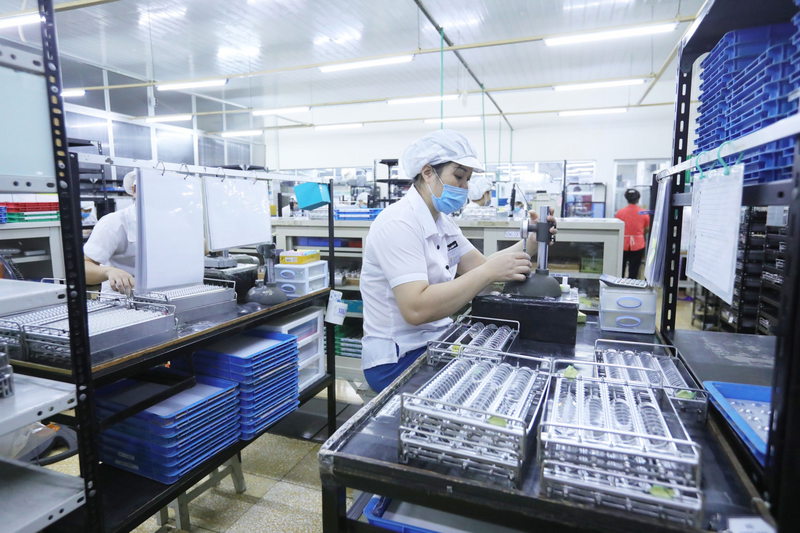
MoIT proposes measures to curb impact of Middle East conflict
19:05 | 23/03/2025 16:05 | 03/03/2026News and Events
By investing over 150 million euros into the newly launched SAP Labs Vietnam, the German enterprise software giant SAP has made a bold statement about Vietnam’s emerging role in the global tech ecosystem. This strategic expansion not only solidifies SAP’s footprint in Southeast Asia but also reflects the company’s confidence in Vietnam’s fast-evolving digital economy, dynamic workforce, and innovation potential.
In recent years, Vietnam has become a focal point of digital transformation in Southeast Asia. The country's digital economy grew by an estimated 20% in 2024, contributing 18.3% to the national GDP, three times higher than the overall growth rate. This surge stems from a young, tech-savvy population, increasing internet penetration, and robust policy support from the government. Sectors such as fintech, e-commerce, logistics, and enterprise solutions have thrived under this digital wave, and global investors have taken notice.

SAP announced the official launch of SAP Labs Vietnam with plans to invest more than €150 million over the next five years into the digital innovation hub
Against this backdrop, SAP’s decision to set up its second Southeast Asian SAP Labs hub in Ho Chi Minh City is both timely and strategic. It underscores Vietnam’s ascent from being a low-cost outsourcing destination to becoming a full-fledged innovation and development hub.
SAP’s Global vision meets local ambition
SAP has a long history of supporting enterprise transformation across the globe. With its Labs Network spanning 20 countries, SAP Labs serve as R&D engines driving the development of cutting-edge solutions in areas like AI, cloud computing, sustainable supply chains, and enterprise resource planning (ERP). The Ho Chi Minh City hub joins this global effort, bringing Vietnam into the core of SAP’s innovation pipeline.
But this launch goes beyond software development. As Thomas Saueressig, Member of the Executive Board of SAP SE, put it, “SAP Labs Vietnam is more than a development center - it’s a catalyst for innovation in one of Asia’s most dynamic tech markets". Vietnam is not only a new location, it is a growth engine for SAP's ambitions in Asia-Pacific, particularly in fast-digitizing economies like Korea and Japan that increasingly demand localized, agile solutions.
One of Vietnam’s greatest assets is its growing pool of skilled engineers. Every year, thousands of students graduate with degrees in information technology, engineering, and data science. According to industry reports, Vietnam is home to over 530,000 software developers, with more joining the workforce annually through universities and coding academies.
SAP Labs Vietnam has already hired over 200 employees since its soft launch in September 2024 and plans to expand to 500 by 2027. In 2025 alone, 350 new hires are expected, with roles ranging from software engineers and data scientists to AI specialists and product managers.
What sets SAP’s approach apart is its strong emphasis on collaboration with local academia. By partnering with top universities in Ho Chi Minh City, SAP aims to create structured career pathways for students, offering internships, mentorship programs, and training in advanced areas like artificial intelligence, cloud architecture, and enterprise application development.
“We’re not just opening an office, we’re building a talent ecosystem,” said Manik Saha, Managing Director of SAP Labs Singapore and Vietnam. This vision reflects a long-term commitment to talent development and knowledge transfer, positioning Vietnam as not just a cost center but a source of innovation.
Boosting local innovation and business capabilities
SAP Labs Vietnam will play a central role in advancing intelligent enterprise solutions across SAP’s product portfolio. From developing sustainable supply chain technologies to refining AI-driven customer experience platforms, the lab’s output will have both local and global impact.
For Vietnamese businesses, this also means greater access to tailored enterprise solutions. Local companies in industries like manufacturing, retail, logistics, and finance stand to benefit from SAP’s deep expertise in digital transformation. Through SAP’s localized solutions, Vietnamese firms can scale faster, become more competitive in global markets, and respond more effectively to market shifts.
Furthermore, the lab may serve as a springboard for local start-ups and SMEs to integrate with global supply chains. With SAP’s ecosystem of clients and partners, new collaboration models are possible, potentially enabling knowledge sharing, joint ventures, or co-development projects that bring global visibility to Vietnamese innovation.
The launch of SAP Labs Vietnam contributes to a broader narrative of Vietnam’s rise as a regional tech powerhouse. Over the past decade, the country has attracted leading global technology companies such as Intel, Samsung, and Microsoft, which have invested heavily in manufacturing, R&D, and software services. The addition of SAP Labs brings a different dimension, enterprise-focused, product-driven innovation rooted in local expertise.
This also aligns with Vietnam’s national agenda to become a digital economy by 2030, with targets such as digitizing all public services, nurturing one million digital workers, and increasing the digital economy’s share of GDP to 30%. SAP’s investment complements these goals, creating synergies between private innovation and public digital transformation.
From a geopolitical standpoint, Vietnam’s strategic location, stable political environment, and pro-business policies make it an attractive destination for companies seeking alternatives to traditional manufacturing hubs. As global supply chains diversify post-pandemic, Vietnam is increasingly seen as a critical link in both manufacturing and digital value chains.
A model for sustainable, inclusive growth
SAP’s presence in Vietnam also carries broader implications for sustainable development. As the company embeds principles of ESG (Environmental, Social, and Governance) into its operations, the Vietnamese lab is expected to contribute to solutions that support responsible business practices, green supply chains, and inclusive innovation.
More importantly, the lab reflects a shift in how multinational companies perceive their operations in developing markets, not as peripheral support centers, but as strategic growth engines capable of shaping future technologies and business models.
Viet Nguyen, Managing Director of SAP Vietnam, summed it up: “Vietnam’s digital transformation and young, tech-savvy workforce are central to SAP’s vision for inclusive, sustainable growth.”
The establishment of SAP Labs Vietnam is a strong vote of confidence in Vietnam’s potential as a technology and innovation hub. It reflects the country’s readiness to move beyond manufacturing and outsourcing into high-value, knowledge-driven development. For SAP, it represents a crucial step in expanding its innovation network in Asia and responding to the growing demand for localized, intelligent enterprise solutions.
But perhaps most importantly, this move plants seeds for a new generation of Vietnamese innovators to co-create technologies that will shape the future of global business. In a world increasingly defined by digital interdependence, the success of SAP Labs Vietnam could become a blueprint for how global companies and emerging economies can grow together.

19:05 | 23/03/2025 16:05 | 03/03/2026News and Events

19:05 | 23/03/2025 16:04 | 03/03/2026News and Events

19:05 | 23/03/2025 15:18 | 03/03/2026Tourism

19:05 | 23/03/2025 14:38 | 03/03/2026News and Events

19:05 | 23/03/2025 11:24 | 03/03/2026Investment